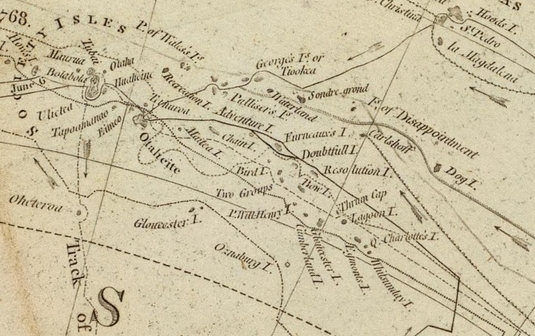Voyaging Between Adventure and Resolution
Comparative Literature and Literary Theory, LMU Munich
Principal Investigator: Prof. Dr. Robert Stockhammer

Between Adventure and Resolution Island.
Excerpt from: James Cook/Gulielmus Whitchurch, Chart of the Southern Hemisphere, shewing the Tracks of some of the most distinguished Navigators, London: Strahan 1777.
The project sets out to investigate the textual means by which a voyage may be qualified as an adventure, hence what may be called the ‘adventurousness’ of a voyage. Like the term aventure (Old French), the term voyage is ambiguous, signifying a type of event as well as a narrative account of this event. In philological inquiries, the focus must be on the latter. With reference to Ricardou’s structuralist formula (which, however, must also be questioned), we might say: an “écriture d'une aventure” doesn't necessarily result from any specific events depicted, even though these may well be ‘adventurous’ enough; it is based rather on certain writing procedures, i.e. an “aventure d'une écriture” (Problèmes du nouveau roman).
The project starts out with a present-day perspective, but aims to reach back to classical antiquity. Within this larger frame, however, it concentrates on two case studies, focusing on the 18th and 19th centuries respectively (historical focus), on the Pacific Ocean (geographical focus), and on sea ventures and ships (as means of travel). The corpus comprises very different types of texts, all of which concern particular involvements of writing in voyaging, what may be called ‘ship-writing-connections’, produced in the course of two voyages: James Cook’s second circumnavigation (1772-75), on board the Resolution and the Adventure – the ships which lend the project its title –, and Herman Melville's independent travels in the Pacific Ocean (1841-44).
The working term ‘ship-writing-connections’ comprises texts in the strict sense (log books, journals, various travel accounts, novels, an epic poem, etc.), but also smaller linguistic elements like ship names, or graphic artefacts like maps. Investigating their discursive functions, the project will propose a catalogue of textual features that produce the ‘adventurousness’ of a given text, as an identifiable category, based on analyzing various linguistic units: (a) word, (b) syntax, (c) text segment, (d) type of text, and (e) relation to intertexts.

